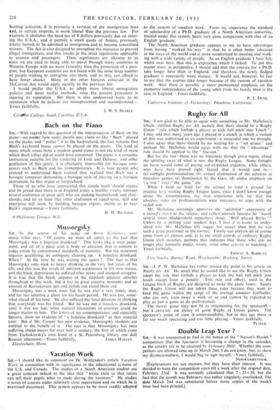Mussorgsky
sill,—In the course of his notes on Boris Godunov, your music critic says, "Of course we must all admit to the fact that Mussorgsky was a hopeless drunkard." This looks like a snap judge- ment, and all of a piece with a body of criticism that is content to judge artists by conventional standards of morality. But the statement requires qualifying, its ambiguity clearing up. A hopeless drunkard. When ? At the time he was writing the opera ? The fact is that Mussorgsky only took to heavy drinking in the very last years of his life, and this was the result of inherent weaknesses in his own nature, and the black depressions he suffered after many and unequal struggles. It is true that the heady impetus of the slapdash amateur attaches throughout to this work, but it has its great creative moments and no amount of Korsakovian spit and polish can cloud them out.
Mussorgsky was a weak man, but he was also a very lonely man, and far too sensitive a plant for his harsh period. He was too, some- what ahead of his time. He also suffered the fatal delusion of thinking that everybody was his friend. But he was not a hopeless drunkard, until it was too late, when musical limitations or excesses could no longer matter to him. The letters of his contemporaries, and especially Stassov, show no evidence of "a hopeless drunkard" at that material time. But if Mr. Cooper has new evidence, Mussorgsky students are entitled to the benefit of it. The fact is that Mussorgsky has been suffering cheap sneers for over half a century, the first of which came from Tschaikovsky's own hand in a St. Petersburg library one dull


































 Previous page
Previous page